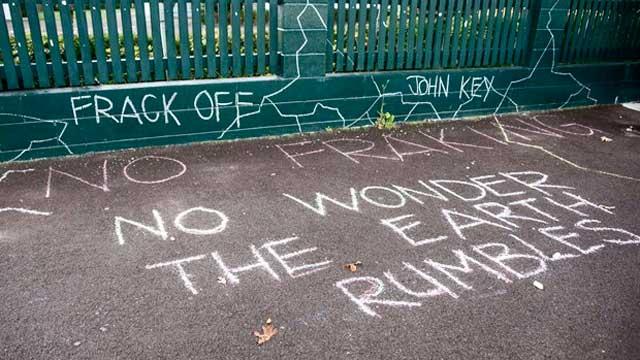
The global grassroots movement to protect public health and the environment from the risks associated with hydraulic fracturing intensified this week in Brussels where citizens came together for an action as part of the Global Frackdown.
As the European Parliament votes on two reports on the environmental and energy impacts of shale, Food & Water Europe, together with Friends of the Earth and The Greens—European Free Alliance, called on the oil and gas industry to “Stop the Propaganda” and on the European Parliament to recognize that the potential of shale gas has been hyped, while the risks and impacts of shale gas have been downplayed.
“The dubious benefits and poor environmental record of shale gas development in the U.S. serve as a cautionary tale for Europe,” said Food and Water Watch’s executive director Wenonah Hauter. “It is worrying that European policymakers have bought into the myth, propagated by the gas industry, that shale gas can serve as a viable bridge to a low carbon future.”
The first coordinated international day of action against fracking on Sept. 22—Global Frackdown—will unite activists on five continents through more than 100 events to call for a ban on fracking in their communities, and to advocate for the development of clean, sustainable energy solutions. Initiated by Food & Water Watch, more than 150 consumer, environmental and public health organizations worldwide including No Fracking Ireland, Friends of the Earth UK, STOPHF of the Czech Republic, Ecologistas en Accion from Spain, numerous anti-fracking associations across France, 350.org and many more are expected to participate in the Global Frackdown.
Worldwide, opposition to drilling and fracking has escalated dramatically over the last year, and the oil and gas industry has intensified its public relations campaign to obscure the dangers of fracking from the public. Earlier this year, the American Petroleum Institute launched its Vote 4 Energy campaign, an astroturf effort to promote drilling and fracking during the 2012 election. A similar campaign is underway in the European Union, where the fossil fuel lobby has been presenting natural gas, including unconventional gas extraction, as a cheap “no regrets option” and painting renewable energy sources as unaffordable. Seeking support from the E.U. for shale gas is an integral part of oil and has companies to turn natural gas into a destination fuel in Europe.
To date, more than 270 municipalities in the U.S. have taken action against fracking; Vermont has banned its use altogether. So have France and Bulgaria. There is a moratorium on fracking in the Czech Republic, Romania, the German state of North Rhine Westphalia, New Jersey and New York. This week, it was also announced that the oil and gas company OMV would also halt drilling in Austria, due to the protests of local communities.
More than 140 events are planned for the Global Frackdown, and each will challenge local decision makers to oppose fracking. Major actions include a rally on the steps of the European Parliament; demonstrations in front of Parliament buildings in South Africa, Bulgaria and the Czech Republic; marches in cities in Argentina; grassroots activities in Paris and the south of France; screenings of "Gasland" in Spain; a "Dash for gas" day of action at the Lib Dem party conference; flyering at the airport of Knock in Ireland; a street theater action in Chicago promoting a statewide fracking ban, and the list goes on.
An increasingly controversial form of energy extraction, fracking involves blasting millions of gallons of water mixed with carcinogenic chemicals underground to release natural gas and oil from tight rock formations. Drilling and fracking have been linked to water contamination and climate change, and the process has been responsible for industrializing rural areas, destroying property values and undermining local economies.
3 WAYS TO SHOW YOUR SUPPORT
- Log in to post comments











